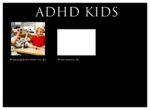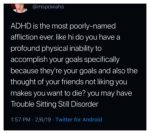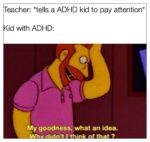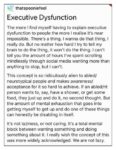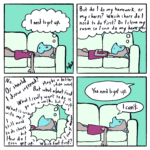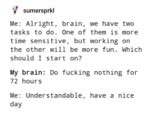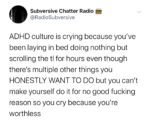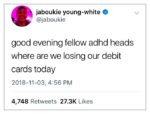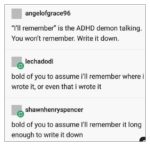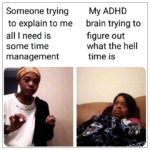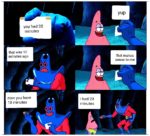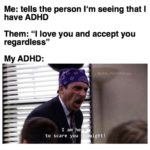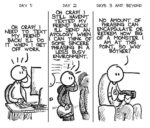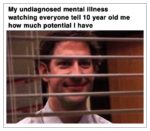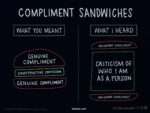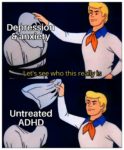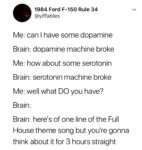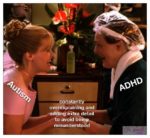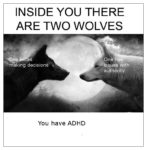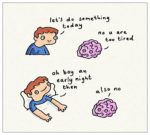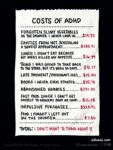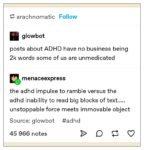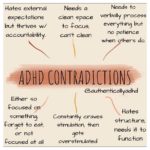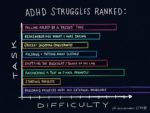Brain\Mind
Musings, news, and research about neurology, brain physiology, psychology, and behavior. Particular focus on Autism, ADHD, and depression.
(Part of the foundation for a case I’m making about biological foundations of ADHD. The “Parkinsonian personality” is well known and the opposite of classic ADHD. ADHD is strongly linked with much higher than normal numbers of dopamine transfer neurons in specific parts of the brain and Parkinson’s disease is directly connected to the death of these neurons.)
The Parkinsonian Personality: More Than Just a “Trait”
Since 1913 patients with Parkinson’s disease (PD) have been described as particularly industrious, devoted to hard work, inflexible, punctual, cautious, and moralist (1). These psychological characteristics have been so constantly reported that the concept of “Parkinsonian personality” emerged. In this regards, in the last few years PD patients have been evaluated according to several models of personality assessment (2), with the Big Five Model (BFM) (3) and the Cloninger’s Psychobiological Model (CPM) (4) as the most used. Studies following the BFM reported that PD patients presented high levels of Neuroticism and low levels of both Openness and Extraversion (5, 6), while studies using the CPM described the temperament of PD patients as characterized by low Novelty Seeking (NS) and high Harm Avoidance (HA) (2, 7, 8). As a matter of fact, the high HA could be responsible for the Parkinsonians’ tendency to be cautious, fearful, pessimistic and shy, while the low levels of NS could account for the tendency to be unsocial, frugal and orderly. Under different points of view, the “Parkinsonian personality,” as it has been consistently reported in literature (7, 9), shares several clinical features with the obsessive-compulsive personality disorder (OCPeD) as classified in the Diagnostic and Statistical Manual for Mental Disorders (DSM) (10).
The OCPeD is defined as a “chronic, pervasive, maladaptive pattern of preoccupation with orderliness, perfectionism, mental and interpersonal control at the expense of flexibility, openness, and efficiency” (10). In the general population, it is the most common personality disorder with a lifetime prevalence reaching the 9.3% (11). Classically considered as stable over time, an increasing number of observations allow to hypothesize that the clinical presentation of OCPeD is less stable than originally assumed, being possible to detect the occurrence, attenuation, or relapse of obsessive symptoms across the life-time (12, 13). While the correspondence between the presence of high HA and low NS levels and OCPeD has been investigated in the general population over the years (14–16), no studies on the correspondence between these temperament traits, configuring the parkinsonian personality, and OCPeD have been conducted in PD patients.
Original article:
I just tried to catalog the running programs in my mental background, the ones that hover just below conscious attention. I can become aware of each process by thinking of it but like most healthy patterns you aren’t really supposed to bother yourself with anything that’s running properly. Conscious attention is a costly resource and your living system respects that. Most of these app-like status monitors will send you a little “throat-clearing” style please notice me signal when discomfort in that area requires your attention, – when it literally requires your conscious attention – even it that is just shifting your butt because your legs are tired.
Basically, they stand politely in the background like a row of servants on Downton Abbey until they are sufficiently pressed to interrupt us as we read our very important memes.
“Ahem.”
“Damn it all, Pennyworth, I’m a busy man! What is it now?”
“Pardon me, M’lud, I believe you have a rather pressing poop to attend to.”
These are some of the conditions being monitored unconsciously by my mind:
- Safety/Danger (no active threats, scanning)
- Sleepy/Awake (tiny bit sleepy but well slept, mid-morning)
- Hungry/Full (recently eaten, comfortable)
- Pain/discomfort/comfort (tiny headache, sitting too long)
- Muscle fatigue/readiness (feel able to move, respond…expend consistent energy over time, restless)
- Mouth, teeth, tongue (clean? comfortable?)
- Need to poop? – need to pee? (some fullness, not ready yet)
- Balance, equilibrium (maintaining)
- Ambient noise – and exceptions (normal sounds, fridge, shower, distant cars)
- Hormonal regulation ( I feel male, somewhat interested in sex, prefer dominance…not stressed)
- Time of day (day underway, not far advanced)
- Time of year (Spring ending – Summer beginning)
- Recent memory clips (yesterday driving, sleep, breakfast)
- Anticipation scenarios – the future imagined – disparate upcoming events (What to do today, next week: Love, friendship, family, work)
- “Don’t forget” (Occasional anxiety reminders)
- Happy/Sad (calm and mildly happy, wistful traces)
- Long term memory flickers (old girlfriend, my family, teaching, random places and moments)
- Ambient smells (Due to being home the smells are too familiar to notice, only hot spots stand out)
Each of these is the organized synthesis of several mental and physiological subroutines. They cooperate and appear as a discrete process.
“Oh man, I’m starving” requires the cooperation of multiple “moving parts” of our neurophysiology and organs functioning smoothly and silently until some silent version of our executive function gives the order to inform the conscious mind to get off its ass and eat.
The Arbitrary Self
Depressive behavior such as bad sleep hygiene, inactivity, social avoidance, over-thinking, etc. Evokes in us a loser personality: The feeling of being a loser. The deeper that feeling, and the more we buy into it, the more we come to see it as a fact. Since only a fool argues with facts, we limit our hopes, minimize risks, and adapt to the dispiriting expectations. Down we go.
Better self-care like exercising, meditating, cleaning up, etc, begins to evoke a can-do sort of personality, who feels at least more like a winner. Again, the more we believe that winner feeling the more factual it seems. This person starts more conversations and makes more ambitious plans for themselves.
Of course, we have core phenotypic personalities from birth but they morph into variations on your theme based on what we “feed” them. Obviously, our actions are catalysts for good or bad outcomes, but the power steering the life that follows is our identification with upbeat or hopeless feelings. The resulting sense of self from either path becomes the self-fulfilling prophecy of a life lived according to the optimism or pessimism flavoring each moment.
So self-talk shapes the future, but self-talk also shapes our beliefs about taking better actions to feel better. There is already a sense of reality, of fact, firmly in place and talking to us about whether there’s any point in trying.
Think of your disappointments. Perhaps you can’t get into shape, can’t find the right person or the right job. If you are already rejecting what I seem to be suggesting, I’d like you to notice the mechanical negative voice in you directing the course of your future life. This voice demonstrably has an executive role in your decisions…which suggests it is the project manager for you getting into shape, finding love, and finding a job. To get anywhere with this you need to understand your relationship to that voice. Who is it? Who put it in charge? Why does it remain in charge despite poor results?
First of all, it isn’t really you, and it isn’t alive…its a mechanism. Next, it doesn’t automatically have your best interests at heart, it’s like the cumulative rejections, real and imagined, absorbed by you as a child. These have compressed into this thing carried inside you like a piece of shrapnel. It isn’t even you, save that you have internalized it. It is the voices of those who made you feel hopeless, alone, and unwanted on loop. Eventually, it sounds so familiar you think it’s your own voice. When something silences the voice you feel strange and exposed, naked in the open. You may feel ashamed and foolish to think positive thoughts about yourself and your future. We don’t recognize ourselves without it yet it is literally the voice of our enemies, crystalized in us as grief and shame. Grief and shame become filters for our hopes.
Some of us are born more vulnerable to criticism and judgment, and some nearly immune. But who we seem to be today is the rather arbitrary result of the coping mechanisms, self-talk, and self-care that took shape in us in the overheated darkness of very early childhood. None of it was inevitable or fated. To deal with the world, we tried things, some worked and we clung to those and built upon their theme. Our style of communication and problem solving, listening, etc. is the result of hundreds of battle strategies formed in struggles with parents, siblings, strangers and ourselves.
We are most oppressed and limited by certain ideas we have complete faith in. That faith may be so strong that we don’t even know it is there because we trust it as we trust our next breath of air. It’s this arbitrariness about who we think we are that must be deconstructed if we want more freedom and choice. Your problems with weight and love and work are created and managed by the same perspective you send in to solve them. That mind doesn’t understand how it creates these problems or why it fails to solve them. Most of the changes we long to see in ourselves depend upon steps that our executive decider automatically rejects out of hand. Our first problem isn’t our weight, love, or work. It is the self we wholeheartedly believe we are.
Two Simple, Useful Techniques
- Meditation of any flavor loosens the ropes and offers many other benefits. But doing positive self-talk meditation makes two things happen, A. You actually start to feel more positive, and B. The negative voices are still there like Goth Mynah birds but by changing the general tone of self-talk for the better you will actually hear the negative voices as distinct, and not really your voice. Then you can look at their simple mechanism and bit by bit shut it down and replace it. This is a conscious process over the long run with gradual improvements. If you feel a lot of resistance at the start of positive self-talk it’s certain that you should try this.
- Go online and take an Enneagram test. These aren’t like Myers-Briggs or Astrology. The enneagram is basically a portrait of arbitrary self, what Gurdjieff called “false personality”. Don’t get hooked on whether the traits are good or not, as people work on themselves they gradually become less clearly any one of the types because their goofy coping strategies aren’t leading them around behaving mechanically.
You contain a 3D sensory map of your life. It is constructed in real-time and space as you move, as you, the pen tip, extend the map. An adult’s map would look like the busy tangle of way-points in the narrative-line of a child’s drawing. You know, the drawn line that accompanies “Then, they went here and saw a witch! They were so scared they had to go over here to the hospital! ”
Can you imagine the map from above? Superimpose it over a world map or your country map. The places you lived a long time are burned in like an angry scribble, the one-off but memorable trips may be like islands only connected to your mainland with faint travel lines. Mixed in with the streets and parks of your memory, attached to them, are the smells of all these places. That incredible honeysuckle jungle by the elementary school playground? It waits for thee. You contain a 3D map overlaid with a museum of scent and stink.
Here’s the bare bones neurology: “Place cells” lay down connect-the-dots, step by step maps of the real world in your hippocampus. They also bind to local aromas, creating our scent memories of specific locations. If you can remember the smell of your grandparent’s home and think about that place, that is this function at work.
- My grandparent’s house smelled like varnish downstairs where Grandpa made furniture and like grape juice, knackebrod, and unknown Swedish spices upstairs in Grandma’s domain. Opening closets and long-closed boxes, even lying on the bedspreads in that house left strong scent memories with no names.
- To return home we rode the Long Island Railroad, smelling of people’s coats, train engine, newspapers and whiffs of the day outside when the train stopped and inhaled.
- Next, the subway, smelling of the warm wind it carried along, orange drinks, hot dogs, and more coats.
- Home, at last, smelling of drink and smoke and many books but above all, smelling of home.
This is why experiencing a sudden strong scent memory takes you out of the moment. You have been contacted by yourself in another time and place. Some memories come when we call them. Others only emerge as you return to their actual spot. It’s as if we suddenly recognize each other, that place (inside us, on our map) realizes we have returned. The surprise of recognition seems to come from both sides. In these very rare moments, I feel the experience of the child I was for a gleaming second before it vanishes like a dream.
Imagine how much more important this is in the lives of animals whose nose is basically their executive function.
Here’s a simple proof of concept game. Consider these smells and try to remember either the last place you smelled them or the place that automatically comes to mind. This would be so much more powerful with actual scents. I found many didn’t immediately suggest a place but if I kept it in mind for a little, a place came into focus, filling in around the scent.
- Hay, fresh-cut lumber, saltwater docks, cedar, aspirin, leather, play-dough, newly printed book.
- And a few less pleasant: Pulp mill, sickroom, smothering perfume, unclean body odor.
Nancy Kanwisher covers the neurology in depth below. (She has an entire MIT neurology lecture course on YouTube.)
I didn’t write this, I lived it. All I would add is that for most of these, the word ‘child’ could just as well be; friend, sibling, partner, employee. Credit to the anonymous author.
- I’m trying way harder than you’ll ever know even though it doesn’t seem like it to you. I really, truly am.
- Criticizing me or getting angry at me that my brain doesn’t work better doesn’t help me. It makes me hate myself even more.
- I’m painfully aware of all the areas that I’m not measuring up. Instead of making a big deal about my shortcomings, try to find ways to help me.
- An accommodation isn’t the same as enabling. If you help me where I’m genuinely struggling, I’m going to be grateful. Don’t assume that I’m manipulating you.
- I’m not doing this to you, it’s NOT something I am doing on purpose.
- If you think it’s hard to live with me, imagine trying to live inside a body that won’t do what you want it to do.
- My brain doesn’t work right but I don’t know how to tell you that. It makes me angry and unkind, but I’m not trying to be that way.
- When I’m being horrible, what I really need is for you to tell me you’ll love me no matter what. And maybe hug me, too. I probably believe that I’m unlovable, so prove me wrong.
- I know that my lack of motivation is frustrating, but pushing harder doesn’t help me do better.
- My anger and frustration is a result of my brain not processing properly. When I’m overwhelmed and freaking out, don’t escalate by freaking out or getting angry too. I need you to be calm and show me that everything’s going to be fine even when I feel like it’s not.
- If I get overwhelmed, don’t expect me to sort out the problem all by myself. The part of my brain that controls regulation doesn’t work properly. That’s why I need your help to regulate.
- Don’t try to break me of things that you see as weaknesses. My sensitivity as a child means I’ll be compassionate as an adult. My stubbornness as a child means I’ll be independent and assertive as an adult. Instead of squashing these characteristics, channel them toward something good that can benefit me when I’m older. Don’t view me as something that needs fixed or toughened up.
- Don’t be afraid of labeling me. A label gives me answers and help. If my condition is serious enough to need to be diagnosed, you can guarantee that I’ve noticed something’s wrong and I’m wondering why I’m different too. Unless you tell me what’s going on, I’m likely to grow up angry and confused about why everyone has it all together and I don’t. A label means I can get help, it gives me answers and vindication.
- I have a real, actual medical condition in my brain. It’s just as real as if I had Type 1 Diabetes. Just like Diabetes, I need help to deal with the condition. No one tells someone with Type 1 Diabetes that they are lazy if they’re tired because their blood sugar is low. They understand that it’s part of the condition.
- Please, please, please learn about my condition, and don’t blame me for things that are out of my control. Just like leaving Type 1 Diabetes untreated results in serious complications and even death, untreated ADHD can lead to serious complications – potentially including death. Thankfully, there are many ways to treat ADHD (and medication isn’t the only way but a sure way to help me).
- My frontal lobe is developing 30% behind normal. Please understand this and don’t put me in situations I’m not ready to handle. If you give me responsibility that’s beyond my developmental age, don’t be angry with me that I do poorly. That’s setting me up for failure, and that’s just cruel.
- Stop expecting me to be normal. I can’t be. Not for all my trying. Until you accept that, I’ll always be a failure in your eyes, and I’ll always view myself as not good enough.
- You have the power to make me miserable by how you treat me. Remember to treat me with love and grace. Treat me how you would want to be treated if you were struggling with a problem in your brain. I may make myself miserable sometimes, but don’t add to that by treating me poorly. When in doubt, be kind. Believe me, I need your kindness, love, support, time and validation.
Nobody Understands (but they all think they do)
Executive Dysfunction, motivation, avoidance, resistance, disorganization
Memory: Short term, long term, working, and nonexistent
Time Blindness, distortion
Emotional Mess: Rejection sensitive dysphoria, anxiety, depression, guilt, shame, despair, etc.
Random leftovers
Knowing Things We Never Learned:
Nearly all of us must struggle diligently to acquire even modest talent in Mathematics, Music, and Art. We encounter genius as a rare group of people who display an amazing gift that seems to come to them easily compared to our sweaty, grinding, display. People with this kind of talent are sometimes called savants. Below them are random individuals of great talent and below them, the rest of us in a bell curve spread from mediocre to hopeless. Yet effortless, genius-level mastery of these areas appears to be latent in our brains, modularized in you and me, right now. How to back up such a claim? We learn much about ourselves through the exceptions of pathology and extreme variation. A break in the pattern reveals the pattern.
There are three kinds of savants that reveal these “genius modules”. Continue reading
I began meditating a few months back and it feels very positive, even transformative. That feeling is backed up empirically.
There are a number of interesting published studies on the effects of meditation but these two are amazing! Both have high strength of evidence. The titles below link to the full articles. Here’s the nutshell summary:
- Long term meditation alters brain anatomy in positive ways, such as larger hippocampal and frontal volumes of gray matter
- Meditation and yoga can rewrite our DNA and alter the gene expression of enduring trauma and stress correlates
“The Brain tunes itself to criticality, maximizing information processing”
Our brains are clearly amazing at processing the “blooming, buzzing1” world around us. A recent experiment supports the theory that when neurons work together they actively cooperate to achieve their maximum processing capacity. They seek the urgent, intense edge of their ability. Picture them as the human runners in an Amazon “fulfillment center” except happy in their work.
The entire brain appears to seek this set point or default working state at the maximum of its abilities: “Where it is as excitable as it can be, without tipping into disorder, similar to a phase transition.” A phase transition is where matter transitions from one state, liquid, solid, or gaseous, to a different state.
In other words, our brains are balanced about one millimeter from chaos and disorder. That’s all of us, all the time. Returning from sleep or other off duty moments the brain tunes and retunes itself seeking this point.
While the study neither reveals nor claims anything else about our neurology, I think it points a bright red arrow at possible organic causes of ADHD (as well as ASD, schizophrenia, etc). If the default human phenome, the standard, mass-produced person has this edge-of-chaos set-point, then genetic variation (known to be the prime cause of ADHD) could easily generate a different set point. This variation might generate the quirky, out of step processing that makes us so valuable in the modern workforce, wait, strike that…
It also seems logical that anything that alters this point results in behavioral instability.
More and other interesting details in the reports:
1 William James, writing about sensory processing. : “The baby, assailèd by eyes, ears, nose, skin, and entrails at once, feels it all as one great blooming, buzzing confusion; “
I pray this is the beginning of reducing anxiety for real. Imagine the liberated potential and freedom from fear.
Study of nonhuman primates lays the groundwork for new strategies in treating anxiety
disorders
Boosting a single molecule in the brain can change ‘dispositional anxiety,’ the tendency to perceive
many situations as threatening, in nonhuman primates, researchers have found. The molecule,
neurotrophin-3, stimulates neurons to grow and make new connections.
Link to PDF, further links inside.


